Before we discuss the best ways to find untapped keywords, let’s briefly understand the meaning of untapped keywords and why these are the best keywords for your next blog strategy.
Untapped keywords, also known as underserved keywords, are the ones that no one is targeting on the internet; or quite a few people are discussing those topics and are easy to rank for.
Untapped keywords are often emerging keywords; Such keywords have extremely low competition and low search volume.
But sometimes, underserved keywords have high traffic; Such keywords simply couldn’t get recognition.
The question is how high search volume keywords can also be underserved: The reason that comes to my mind is that most businesses and SEO agencies use SEO tools for keyword research. Tools do not necessarily have up-to-date data and may not provide exact search volume (as they provide an average of 6 months or 12 months, so emerging keywords don’t have accurate search volumes on SEO tools).
In short, underserved keywords may or may not have a high search volume but one thing is for sure, such keywords have low competition.
Here is the second thing; According to Ahref, it takes up to 3 years to rank for a keyword. But that number isn’t for underserved or significantly low-competition keywords.
After trying hundreds of untapped keywords, I have noticed Google often ranks a well-written article targeting untapped keywords instantly on the second page or position 10. And you will secure your best rankings in 3 months.
Thus finding and working on underserved keywords has two significant benefits; With untapped keywords, you rank new content faster on Google. Secondly, you skip the competition, so you don’t need to build backlinks.
Now that you know the significance of untapped keywords let’s discuss the best ways to find such low-hanging keywords.
On this page
Google Ads (100% Free tool)
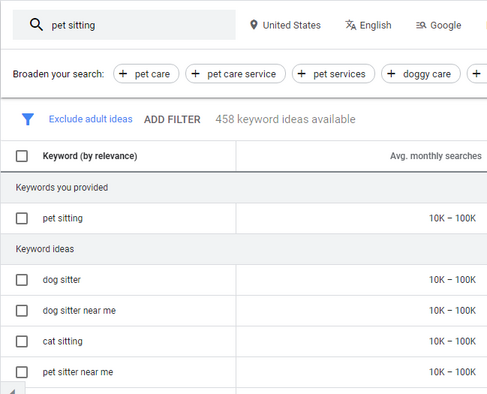
Google makes most of its money from Google Ads.
People spend a lot of money on Google ads, and that’s why Google makes things pretty easy for them. Google helps them find highly converting keywords to target and attract customers.
But this gives all business owners and bloggers a chance to use a fantastic keyword research tool for free. Even all the SEO tools extract data from Google Adwords.
The best thing about Adwords is that it’s free. Anyone can create an account and find the best keywords for blogs and business websites.
Let’s discuss how you can use it for your keyword research.
- Type “Google Ads keyword planner” on Google.com and go to keyword planner or click here for keyword planner.
- Sign in to your account.
- Click “Discover new keywords.”
- Enter your product or service’s name.
- Pick the best suitable keywords for your services.
There shall be thousands of keywords out there. But not all are for you. You need to pick the right ones.
While running a campaign on Adwords, you choose money keywords with high volume. But if it’s for your business blog, it’s better to pick low-competition keywords.
Once you have a list of low-competition keywords, you go to the next step to find the best untapped opportunities.
Here is how to do it.
Here is how to verify your untapped keywords
No matter which tool you use, first of all, collect some keywords (if you are using a tool, then go for low-competition keywords).
Mostly, I use Google auto-complete (the technique discussed at the end) to collect a reasonable amount of keywords around a topic. Then I use SEO tools to find the best relevant keywords for my research.
Once I have some keywords, I start putting all the keywords to find the untapped opportunities.
Analyzing data to find untapped opportunities takes a lot of time, but the results are worth the time.
Here is how you analyze your keywords list to find low-hanging keywords.
- Search your keyword on Google.com
- Do you see all the exact match titles on the first page? For instance, all the results exactly discuss the topic. If so, it’s not underserved. Delete the keyword from your list. Otherwise, check the following things.
- Check domain authority (with Moz bar or Ahref bar). If sites with low DA are on the first page, it means the competition is low, and it won’t require backlinks.
- Do you see any forums, question answers, and social media sites on the first page? If so, that’s great.
- Now open the top 10 results and read. How many of them are exactly satisfying the query? Are you satisfied with the results? If not, that’s great to target such keywords.
- Lastly, I used allintitle:keyword to see how many people targeted that keyword in the primary titles. The lower, the better.
The process will take a lot of time to find untapped keywords, but don’t panic. This effort is the pillar to successful blogging without any competition.
Here is an example to help you pick the right ones.
The example might not be relevant to your industry, but the process is the same for every industry.
The keyword I recently found is “best Japanese oven for baking.”
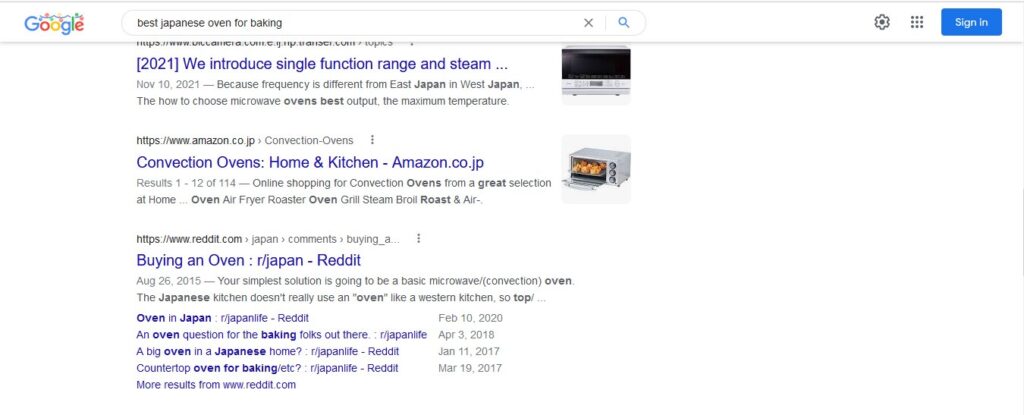
You can see that the results don’t discuss the topic, and Reddit is also there. The search intent is different from the results.
The last step is to check if people use the main keywords in their titles.
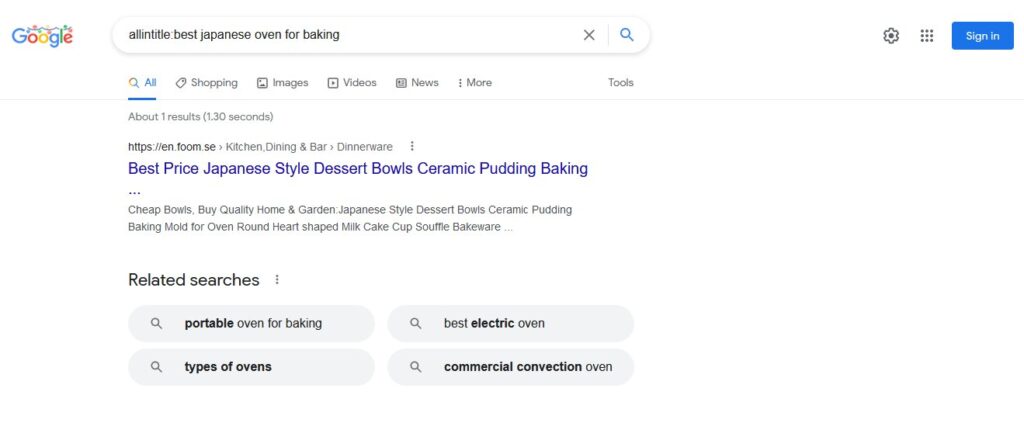
Luckily, there is only one website discussing the exact term. But it doesn’t happen all the time.
I use main words instead of complete phrases to get more accurate data. For instance, in the example mentioned above, it will look like allintitle:Japanese oven baking.
Now let’s move forward to the other ways to find low-hanging keywords.
Bing Keyword Research Tool (100% Free tool)
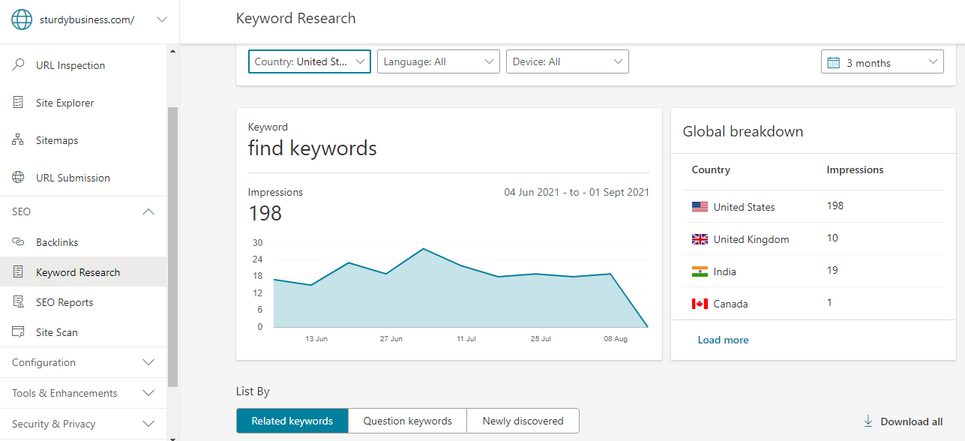
Bing is the second big search engine; Americans use Bing the most.
If you are in the United States, or at least you are targeting the United States, then you can’t forget the Bing Keyword research tool.
Bing also offers a free keyword research tool.
These keywords will help you for Bing and other search engines because the problems in a specific area are the same for all customers.
If some people search for a query on Bing, they must explore the exact problem on Google with a few variations.
Let’s say you are looking for keywords, then the different variations we see on Google and Bing are “how to find low competition keywords?”, “how do I find keywords for my business?” and “how to find fresh keywords for a business blog?” etc.
The answer is the same for all search terms. That’s why if you find something great on Bing, it will work for all search engines.
Here are a few easy steps to use the free tool.
- Click “Bing webmasters keyword research“.
- Sign in if not already.
- Put the main topic.
- Pick the right keywords.
Finding many queries in front of you won’t take more than a minute.
Keyword Surfer – 100% Free Tool
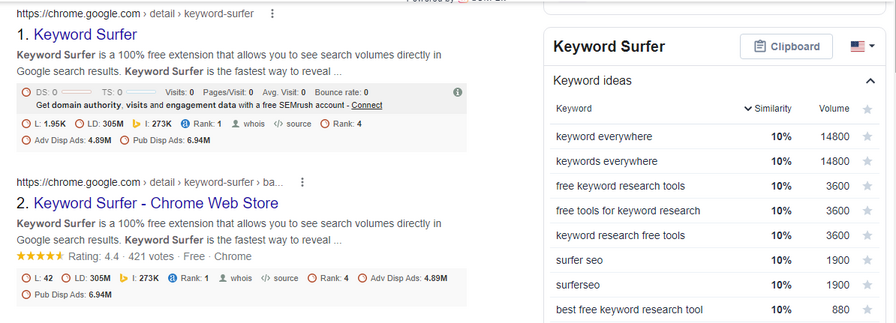
Using as many apps and tools for your SEO gives you more untapped opportunities. You are more likely to see queries that different apps and tools have gathered in their database.
That’s why I use many different tools for my research.
Keyword Surfer is one of them. Keyword everywhere is also a freemium app similar to keyword surfer. You can use any of these apps.
I use the keyword Surfer as an extension that tracks all my queries and gives me an idea of what relevant phrases people are searching for and how much volume those queries have.
It’s pretty easy.
- Type “Keyword Surfer” on Google or Click here to install the Chrome extension.
- Once installed, search for any query on Google.
- Get ideas relevant to that query in the “Surfer Box.”
Pick the best keywords following the same method mentioned above. (Search each keyword manually to check if it’s explored or not).
Ahref keywords Explorer
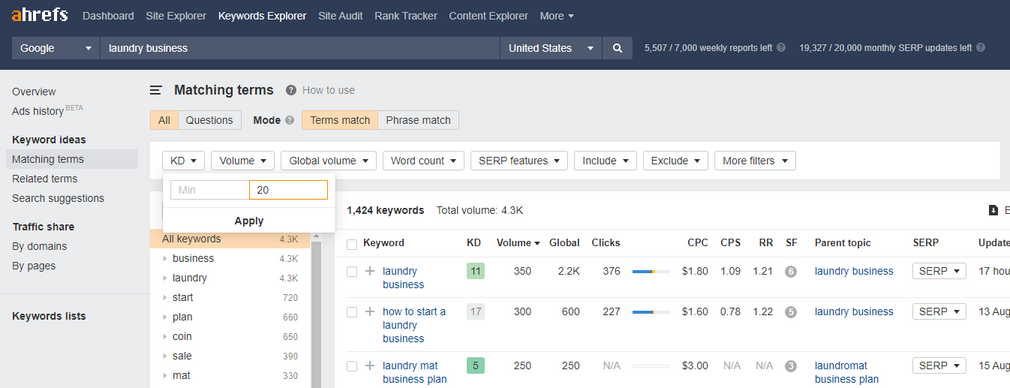
Along with free tools, I use two paid tools to see if I can find some fantastic ideas for my blog.
Remember that no matter how expensive the tool is, it won’t show accurate data about a query. It’s always up to you to judge whether the query can have great searches. Ahref is one of the best keyword research tools in the market.
Using Ahref Keywords Explorer is pretty easy.
- Go to Ahref.com
- Click “Keywords Explorer.”
- Put your main topic, and click search.
- Click “Matched terms” to see find opportunities.
- You can adjust your search with filters like Keyword Difficulty (KD), volume, Word count, and other filters.
- Pick the right ones for your business.
Ahref Free keywords generator
Ahref now offers a free version too.
You can get 100 keywords for each head term. The data is limited, but it’s still helpful to run a blog.
Here is the Ahref free keywords generator.
You can find untapped keywords with the free version too.
Storybase (Best Paid Keyword Research Tool)
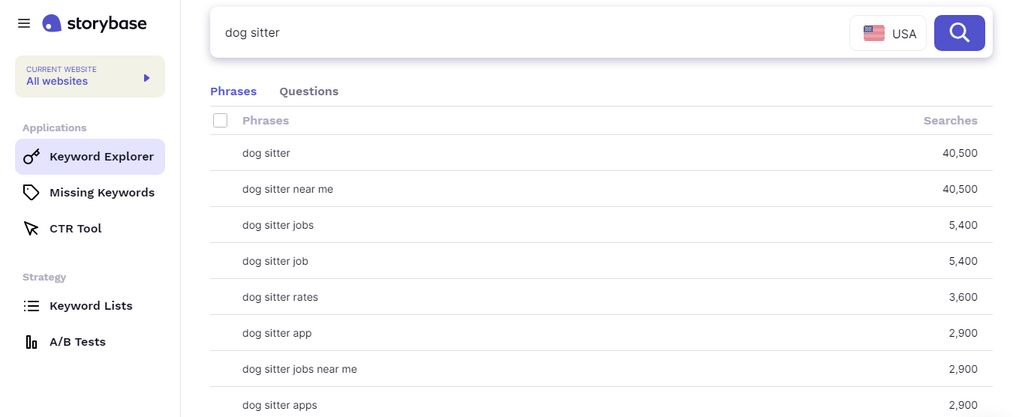
Storybase is one of my favorite keyword research tools. It’s also easy to use.
- Go to storybase.com
- Click “Keyword Explorer.”
- Type your main topic; let’s say it’s “Dogsitter.”
- Pick the right queries for your business (or blog).
Just like Ahref, StoryBase also has an excellent database. It’s worth investing in.
Google autocomplete (free keyword research)
Here is how to find underserved keywords with Google auto-complete.
First of all, clear your browsing data, and remove cookies. Or open an in-cognitive mode.
If you are finding it for your country, that’s great. But if it’s somewhere else, then you should use a proxy to change your IP.
Suppose you are outside the USA, UK, or Canada and want to target any of these countries. Find a proxy that will let you browse from that country.
Be closer to that place if it’s a local business because Google provides queries based on your location (and browsing history).
Now follow the following steps to find untapped keywords for your business or blog. You can also use the exact strategy to find LSI keywords as well.
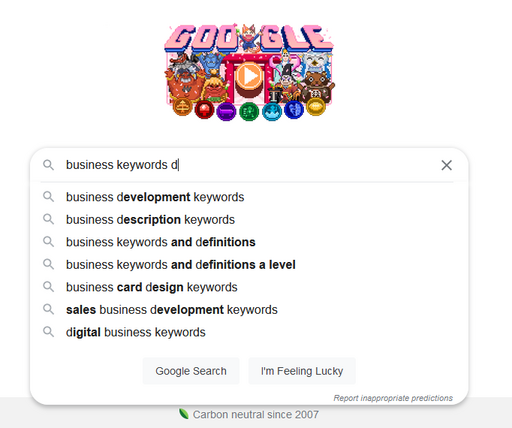
- Be very clear about your niche.
- Pick a broader term for which you want to find a keyword. For instance, it’s “business keywords,” “laundry services,” “beauty tips,” “health care,” or “pet services.”
- Put that keyword in google.
- Give a space.
- Now write the alphabet “a,” and many queries will appear.
- Test all those queries in Google to see if the exact answer is available.
- Now write the alphabet “b.”
- And follow the last step once again.
Keep doing it for all the alphabet.
You will soon see that there are still tons of free opportunities that you can pick and target on your website or blog.
Use GSC to find emerging keywords.
Using Google search console is another best way to find some excellent opportunities for your business and websites.
Suppose you have submitted a sitemap in Google Search Console (GSC) that you must do. You will see how the site appears on Google. For which queries and questions, your site appears in search results.
Most of the time, your site will appear for the exact keywords you target on the webpage. But sometimes, Google might find your webpage pretty relevant for an emerging query.
You can target such emerging keywords in your following articles.
Summary
Keyword research is the pillar of online business success. If you can find the best untapped keywords, you won’t require to build backlinks.
That’s why businesses invest a lot of time in it. And as a result, get huge benefits.
We have shared some unique ways to find untapped keywords for your business websites and blogs. You can use free or paid tools to find the best underserved keywords.